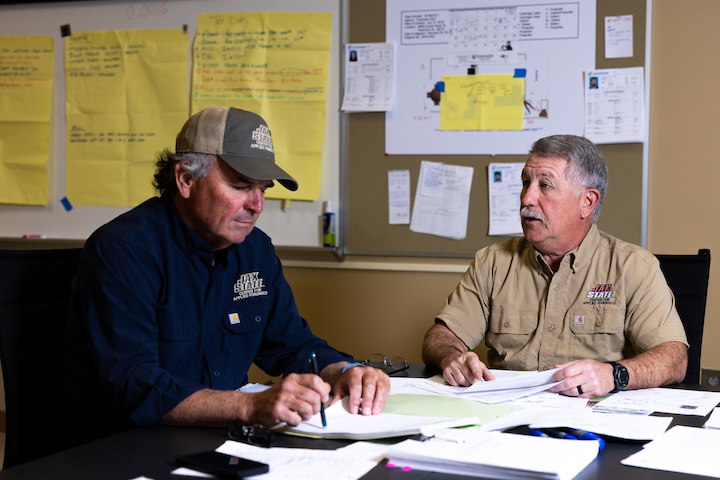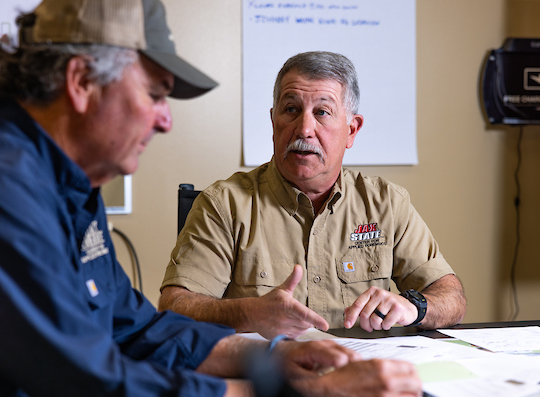Cold Case Program Brings Closure to Families
03/01/2024

by Brett Buckner
Brent Thomas is the epitome of the old-school investigator. His desk is cluttered with yellow legal pads and musty evidence folders pulled from decades-old banker’s boxes. His walls are covered with homicide timelines and the names of potential suspects.
“It all helps with connecting the dots,” he said.
After retiring from the Alabama Bureau of Investigation (ABI) in 2016, Thomas was hired as a part-time investigator at the JSU Center for Applied Forensics (CFAF) to assist local law enforcement agencies with cold case investigations and officer-involved shootings.  “I’ve bought him computers and laptops,” said Mark Hopwood, CFAF director. “But every time I go in his office, he’s sitting there with a legal pad and pencils. Then he’ll stop and ask me for more of those big poster boards. It would drive me crazy going through those files, but he loves it.”
“I’ve bought him computers and laptops,” said Mark Hopwood, CFAF director. “But every time I go in his office, he’s sitting there with a legal pad and pencils. Then he’ll stop and ask me for more of those big poster boards. It would drive me crazy going through those files, but he loves it.”
After graduating from JSU in 1984 with a degree in production management, Thomas started his career as an Alabama State Trooper. He was hired by the Jacksonville office of the ABI in 2003, where he served as a sergeant until his retirement. Early on, he realized he had the temperament required of a good investigator.
“I’m a timeline-logic type of guy,” he said. “I like to know how events flow from one thing to the next, so I have stuff scattered everywhere. That’s when Mark usually walks in and is like, ‘Oh god! Here we go again.’”
But being meticulous and detail-oriented is what it takes, especially when working cold cases.
“There’s no magic,” he said. “You have to be patient, a logical thinker, pay attention to the details, and document.”
That’s one of the main points Thomas tries to convey to the agencies and officers he assists and trains at CFAF. He urges them to focus on how they document, knowing that someone down the line – years or even decades later – may depend on their notes to solve a case like the one he helped crack last summer.
In September 2002, the close-knit community of Heflin, Ala., was shocked by the brutal homicide of Monica Rollins and her six-year-old son, Dalton. The 23-year-old mother was eight months pregnant with her third son, who also died in the attack. Her three-year-old son, Aaron, was found in the home unharmed days later, along with the bodies.
“If you want to help people at the lowest, worst point in their lives, this is it,” Thomas said.
With his help, Heflin police announced in June 2023 the arrest of Lewis Ladon Spivey, an acquaintance of Rollins’ who had been serving a 15-year sentence in Florida for an unrelated robbery and aggravated assault. Investigators say he has confessed to the crimes, and he is awaiting trial.
After the arrest, Thomas was able to sit down with Rollins’ father to answer questions and process his own emotions. When he begins working on a case, he tells victims’ families their lives will be now be forever intertwined.
“From then on, you’re working it for them and for the truth,” he said. “That’s all I’ve ever worked for – to know the truth and to make an arrest. That’s the only thing that will ever give the family and law enforcement closure.”
The Cold Case Program is one of many Jax State initiatives aimed at supporting and training Alabama law enforcement. The program is housed within the Center for Applied Forensics, which provides education, technical expertise and investigative services to law enforcement agencies across the state. To date, the center has trained more than 4,000 officers, processed more than 400 crime scenes and solved 324 cases.
CFAF works in partnership with the university’s Center for Best Practices in Law Enforcement, Alabama Investigator Academy and Southeastern Leadership Command College to support the continuing education and training of law enforcement across the state. The university also houses the Northeast Alabama Law Enforcement Academy.
“Jacksonville State strives to serve as the law enforcement training capitol of the State of Alabama,” said President Don C. Killingsworth, Jr. “We are investing in law enforcement training to not only make a positive impact on the careers of these dedicated public servants, but also on the lives of the people and the communities they serve.”

